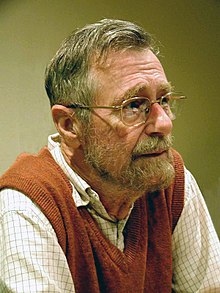Edsger W. Dijkstra | |
|---|---|
 Dijkstra in 2002 | |
| Born | 11 May 1930 Rotterdam, Netherlands |
| Died | 6 August 2002 (aged 72) Nuenen, Netherlands |
| Education | Leiden University (BS, MS) University of Amsterdam (PhD) |
| Spouse | Ria C. Debets |
| Awards |
|
| Scientific career | |
| Fields | |
| Institutions | |
| Thesis | Communication with an Automatic Computer (1959) |
| Doctoral advisor | Adriaan van Wijngaarden |
| Doctoral students | |
Edsger Wybe Dijkstra (/ˈdaɪkstrə/ DYKE-strə; Dutch: [ˈɛtsxər ˈʋibə ˈdɛikstraː] ; 11 May 1930 – 6 August 2002) was a Dutch computer scientist, programmer, software engineer, mathematician, and science essayist.[1][2]
Born in Rotterdam, the Netherlands, Dijkstra studied mathematics and physics and then theoretical physics at the University of Leiden. Adriaan van Wijngaarden offered him a job as the first computer programmer in the Netherlands at the Mathematical Centre in Amsterdam, where he worked from 1952 until 1962. He formulated and solved the shortest path problem in 1956, and in 1960 developed the first compiler for the programming language ALGOL 60 in conjunction with colleague Jaap A. Zonneveld. In 1962 he moved to Eindhoven, and later to Nuenen, where he became a professor in the Mathematics Department at the Technische Hogeschool Eindhoven. In the late 1960s he built the THE multiprogramming system, which influenced the designs of subsequent systems through its use of software-based paged virtual memory. Dijkstra joined Burroughs Corporation as its sole research fellow in August 1973. The Burroughs years saw him at his most prolific in output of research articles. He wrote nearly 500 documents in the "EWD" series, most of them technical reports, for private circulation within a select group.
Dijkstra accepted the Schlumberger Centennial Chair in the Computer Science Department at the University of Texas at Austin in 1984, working in Austin, Texas, until his retirement in November 1999. He and his wife returned from Austin to his original house in Nuenen, where he died on 6 August 2002 after a long struggle with cancer.[3]
He received the 1972 Turing Award for fundamental contributions to developing structured programming languages. Shortly before his death, he received the ACM PODC Influential Paper Award in distributed computing for his work on self-stabilization of program computation. This annual award was renamed the Dijkstra Prize the following year, in his honor.
- ^ "Edsger Dijkstra | Dutch computer scientist". 2 August 2023.
- ^ Istrail (2008)
- ^ Goodwins, Rupert (8 August 2002). "Computer science pioneer Dijkstra dies". Retrieved 22 December 2010.